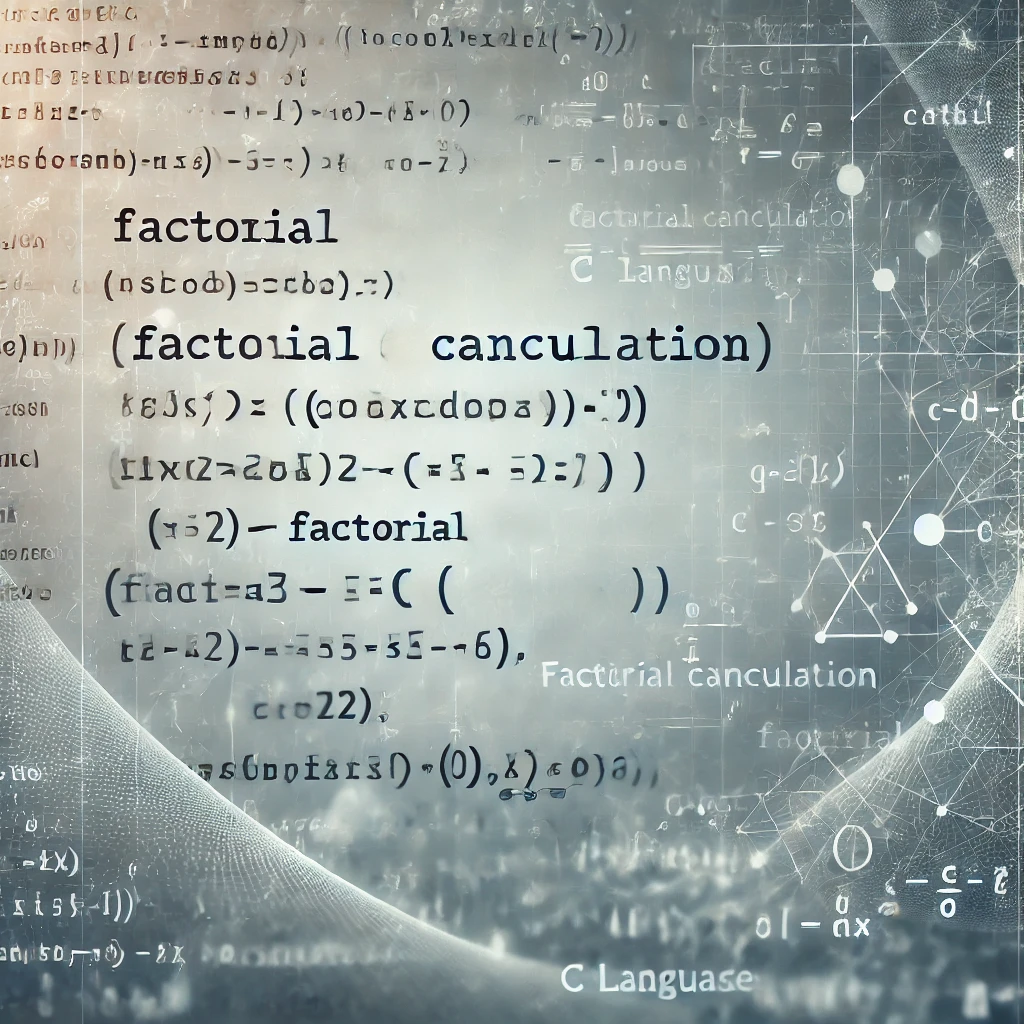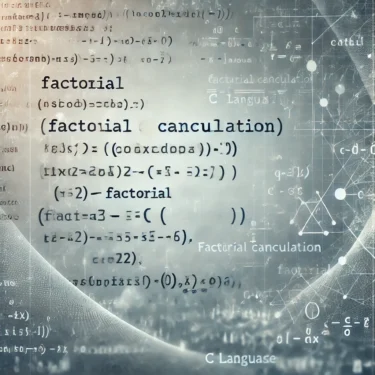1. What Is Factorial Calculation in C?
This article covers the basics of factorial calculation in C. A factorial is the product of all positive integers from 1 up to a given natural number n. In mathematics, this is expressed as follows:
- n! = n × (n – 1) × (n – 2) × … × 1
Factorial calculations play an essential role in many mathematical applications, such as combinations, probability theory, and sequences. For example, 3! (factorial of 3) is 3 × 2 × 1 = 6. In this article, we’ll explain in detail how to implement factorials in C programming.
2. Basic Factorial Calculation in C: Using for Loops
Let’s start by learning how to calculate factorials using a for loop. This method does not use recursion, making it relatively simple and easy to understand.
Basic Implementation with a for Loop
Here’s an example code for calculating factorials with a for loop in C:
#include <stdio.h>
int main() {
int n, i;
unsigned long long factorial = 1; // Variable to store the result
printf("Enter an integer: ");
scanf("%d", &n);
// Show an error message for negative input
if (n < 0)
printf("Factorial of a negative number does not exist.\n");
else {
// Calculate factorial
for (i = 1; i <= n; ++i) {
factorial *= i;
}
printf("Factorial of %d = %llu\n", n, factorial);
}
return 0;
}Explanation
- The reason for using the
unsigned long longtype is that factorials can quickly become extremely large numbers. The standardinttype can’t handle such large values, so we use a data type with a larger range. - The loop repeats from 1 to n, multiplying
factorialby the current value in each iteration.
This method is simple and forms the foundation for understanding how factorials are calculated. Next, we’ll cover another approach using recursion.
3. Calculating Factorials Using Recursion
Factorials can also be implemented with recursion. Recursive functions make the code shorter and conceptually closer to the mathematical definition of factorials.
Recursive Implementation
Here’s an example of how to calculate factorials in C using a recursive function:
#include <stdio.h>
// Recursive function definition
unsigned long long factorial(int n) {
if (n == 0 || n == 1)
return 1; // Base case: factorial of 0 or 1 is 1
else
return n * factorial(n - 1); // Recursive call
}
int main() {
int n;
printf("Enter an integer: ");
scanf("%d", &n);
if (n < 0)
printf("Factorial of a negative number does not exist.\n");
else
printf("Factorial of %d = %llu\n", n, factorial(n));
return 0;
}Explanation
- The recursive function first sets a base case (when n is 0 or 1). Without this condition, the recursion would continue infinitely, so a proper termination condition is essential.
- This recursive approach is very close to the mathematical definition of factorial (n! = n × (n – 1)!), making it easy to understand intuitively.
Recursion improves code readability and simplicity, but for very large numbers, the loop-based approach may be more performant than recursion.

4. Error Handling and Data Type Considerations
When calculating factorials, the result can become so large that it causes an overflow. You also need error handling for negative numbers.
Preventing Overflow
Because factorials grow rapidly, a standard int type is not sufficient. That’s why we use unsigned long long to handle larger values, as shown in the code above.
However, if you need to handle even larger numbers, consider using a big integer library (such as GNU MP).
Error Handling for Negative Numbers
Factorials are not defined for negative numbers, so you must show an error message when the user enters a negative integer.
if (n < 0)
printf("Factorial of a negative number does not exist.\n");This ensures that improper input is handled appropriately.
5. Practical Applications of Factorial Calculation
Factorials are widely used in mathematics and algorithms. Here are some practical examples of how factorials are used:
Combinatorial Calculations
Combinations are used to determine the number of ways to choose a subset of items from a group, and factorials are used in these calculations. The formula is:
- C(n, r) = n! / (r! * (n – r)!)
When implementing this in C, you can easily reuse your factorial function.
Probability Calculations
Factorials are also frequently used in probability theory, especially when working with permutations and combinations.
6. Optimizing Performance
There are several ways to optimize the performance of factorial calculations. With recursive functions, performance can degrade as calculations get deeper, so memoization and loop optimization can help.
Optimization with Memoization
Memoization is a technique where you save computed results and reuse them to avoid redundant calculations. This can prevent deep recursion and boost performance.
7. Summary and Next Steps
In this article, we covered the basics of factorial calculation in C, including recursion, error handling, and performance optimization. Factorials are a key concept in mathematical problems and algorithms. Use this article as a reference and try creating your own programs that use factorials!
Next Steps
Try applying factorial calculations to real projects or applications. For example, consider these challenges:
- Challenge more advanced algorithms
Tackle problems involving combinations or probability, and use factorial calculations to implement complex algorithms. Factorials are often encountered in competitive programming and mathematical challenges, so practicing will build practical skills. - Optimize for large datasets
When working with large datasets, performance optimization for factorial calculation is crucial. Practice writing efficient code using memoization or dynamic programming.



